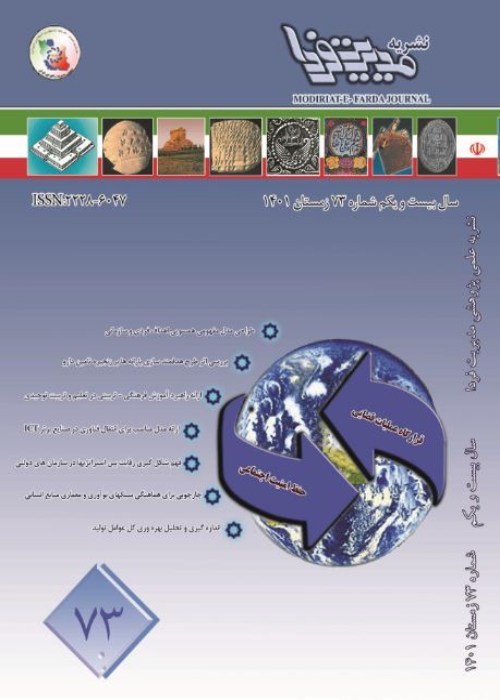Model Designing of Total Softpower Policy the Islamic Republic of Iran
Abstract:
Policy making is a word which usually accompanies by government content. Government strategy in defending area and government plan for security is named security policy making. The goal of policy making is to accelerate or decelerate a changing movement in a part, therefore; policy makings make changes inevitably which should be managed. The mission of the present research is to design a major policy making for soft power (soft warfare) to reach national soft security. According to Joseph Nai, to face soft warfare holding soft power to obtain national soft security should consist of three main criteria; 1. Cultural attraction, 2. Internal political ideals, 3. Foreign policies of a state to own the capability of gaining “ideality” of internal system and foreign societies through attraction and not force or bribing. Vikers (2008) classifies the main elements of a soft power into; 1. Psychological, 2. Social, 3. Political, 4. Cultural, and 5. Scientific elements. According to Imam Khomeini, as he mentioned in his spiritual -political last will, fundamental criteria of soft power are as follows: 1. Cultural, spiritual, social, 2. Science and industry, 3. Economic, 4. Political and military. These criteria in soft power frame, based on the opinions of Imam Khameneyee, are also determined in four groups: 1. Cultural, 2. Scientific-Technologic, 3. Unity and National Identity, political steadiness, 4. Economic and defending. Islamic Republic of Iran Constitution stresses on four powers of; 1. Cultural, 2. Social, 3. Political (domestic& foreign), 4. Economic, to create a soft power and deems them as the main principle for the state development. In the proposed four-dimensional model of this paper, the main criteria for structure of resource of soft power regarding to providing soft security and preventing soft war, includes: Cultural- Social, 2. Scientific-Technological, 3. Political (domestic & foreign), 4. Economic. The following actions have been performed to examine the proposed model: Considering the four resources of soft power and their priority comparing with each other through Delphi and AHP methods Considering the parameters of four resources of soft power and national soft security as well as their priority and abbreviating them through Delphi and AHP methods Measuring the relation of evaluated parameters with indices of national soft security through AHP The relation of permanence and validity and accuracy of answers by Pierson impetus indices Findings of the study reveal that: 1. The main priority of soft power resources is cultural-social soft power, which gained the most marks. 2. The second priority of soft power resources is scientific-technological soft power, which is deemed as the second resource to provide soft power. 3. The third resource in the measurements is political (domestic & foreign) resource. 4. The weakest resource in soft power resources is economic resource. Ideal Model: 3. One-dimensional model “Cultural-Social” 4. The cultural-social resource is the one-dimensional producer of soft power for national soft security which can provide a short-term effect solely. 5. Two-Dimensional model “Cultural-Social” & “Scientific-Technologic” 6. This model enjoys a more strength and effect on production of national soft security. 7. Three-Dimensional model “Cultural-Social” & “Scientific-Technologic”& “Political (domestic & foreign)” 1. Four-Dimensional model “Cultural-Social” & “Scientific-Technologic”& “Political (domestic & foreign)” & “Economic” 2. This model is complete and comprehensive for policy making of effective resources to remove threats and soft war and develops national soft power and makes use of the highest capacities of existing state soft power. Finally, after conclusion, some proposals have been offered to organization, researchers, thinkers and scientists to continue the way.
Keywords:
Language:
Persian
Published:
Management tomorrow, Volume:11 Issue: 31, 2012
Page:
35
magiran.com/p1483149
دانلود و مطالعه متن این مقاله با یکی از روشهای زیر امکان پذیر است:
اشتراک شخصی
با عضویت و پرداخت آنلاین حق اشتراک یکساله به مبلغ 1,390,000ريال میتوانید 70 عنوان مطلب دانلود کنید!
اشتراک سازمانی
به کتابخانه دانشگاه یا محل کار خود پیشنهاد کنید تا اشتراک سازمانی این پایگاه را برای دسترسی نامحدود همه کاربران به متن مطالب تهیه نمایند!
توجه!
- حق عضویت دریافتی صرف حمایت از نشریات عضو و نگهداری، تکمیل و توسعه مگیران میشود.
- پرداخت حق اشتراک و دانلود مقالات اجازه بازنشر آن در سایر رسانههای چاپی و دیجیتال را به کاربر نمیدهد.
In order to view content subscription is required
Personal subscription
Subscribe magiran.com for 70 € euros via PayPal and download 70 articles during a year.
Organization subscription
Please contact us to subscribe your university or library for unlimited access!


